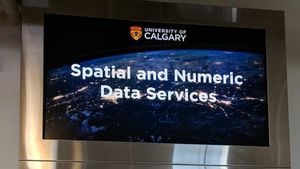Andy Powell has a nice post on general trends in educational use of networking. The context is a reflection on the future of federated access management but the points he makes are more generally interesting. He talks about the economic situation, outsourcing to the cloud and shared services, the varieties of openness, changing student expectations, the growth of mobile, the changing nature of the personal-institutional relationship, the changing nature of the publisher-consumer relationship, and issues of usability.
As usual the entry is well worth reading. One thing in particular has stuck with me. He talks about the ‘personal learning environment’ (PLE), a phrase that emerged some years ago to refer to the bricolage of generally available services from which students and others might construct their learning experiences. It is often used in explicit contrast to the prefabricated workflow environments offered in the virtual learning environment (VLE). (The VLE is a UK term for the course or learning management system).
Andy has a PLE trend …
Similarly, the emerging personal learning environment (PLE) meme (a favorite of educational conferences currently), where lecturers and students work around their institutional VLE by choosing to use a mix of external social web services (Flickr, Blogger, Twitter, etc.) again encourages the use of external services that are not impacted by our choices around the identity and access management infrastructure and over which we have little or no control. I was somewhat sceptical about the reality of the PLE idea until recently. My son started at the City of Bath College – his letter of introduction suggested that he created himself a Google Docs account so that he could do his work there and submit it using email or Facebook. I doubt this is college policy but it was a genuine example of the PLE in practice so perhaps my scepticism is misplaced. [eFoundations]
Now, while the reference to the PLE is apt, I wondered whether the letter was a sign of a more general trend.
We have become used to a general level of ‘infrastructure provision’ from large web providers (the emergence of apps notwithstanding). This includes search and, by now, I think, email. We pay with our attention (advertising) or may be a small fee for a ‘pro’ service (see Flickr for example). These seem to be so well entrenched that we find it difficult to imagine them reverting to more niche services for which we pay a charge.
Now there are some services which we can imagine going away. Slideshare, for example, is a very useful service. However, recently I have found its banner ads very intrusive. Maybe it will be absorbed into a bigger service? Maybe it will go away? Maybe it will rely more on its freemium model?
What about Google Docs or Facebook? These are the examples Andy gives. Have they become part of the infrastructure we expect to be available to us as part of our everyday network use? I suspect that they have. Google Docs may not have the heavy use of other services, but it is there, it is part of the Google suite, and if it does goes away it is likely that alternatives will be available (as of course some already are). We are likely to have various services as part of the ensemble Google, or Microsoft, or Apple, assembles for which we pay in various other ways.
The network application infrastructure has become thicker.
Coming back to PLEs or to the educational enterprise … neither of these services is integral to what the university or college offers. They complement or augment what is available, or they replace functions that are not especially distinctive.
Which of course prompts the question about where the university focus should be …. especially in the current environment of budget reduction.
What is distinctive and should not be ceded to third party network services?



